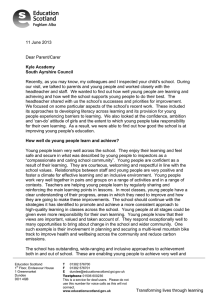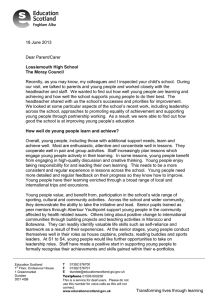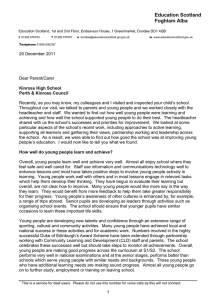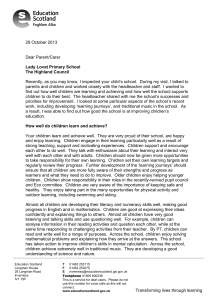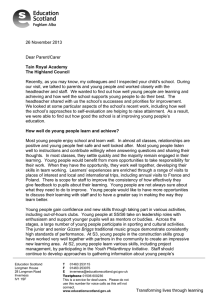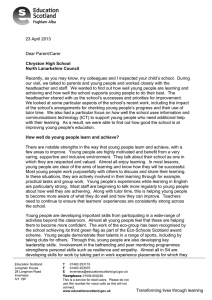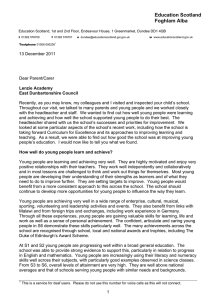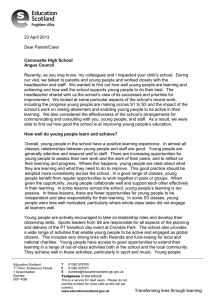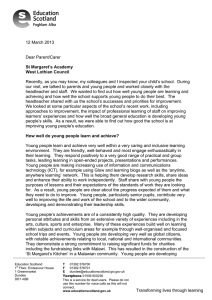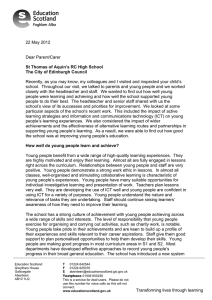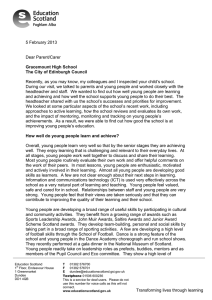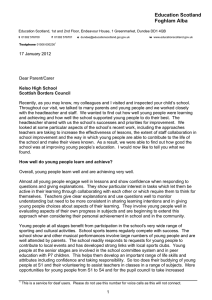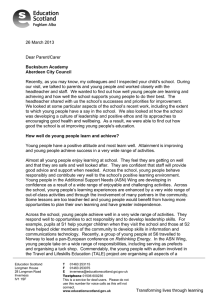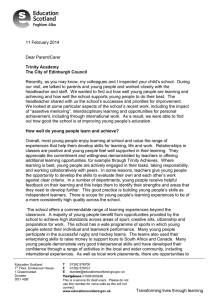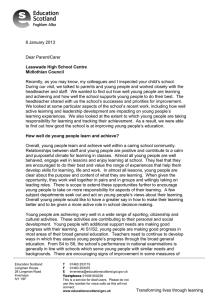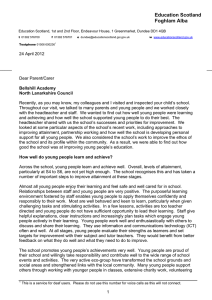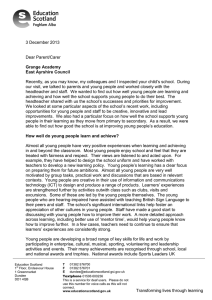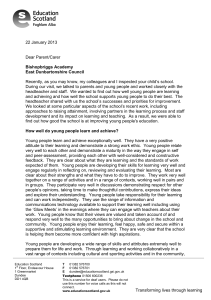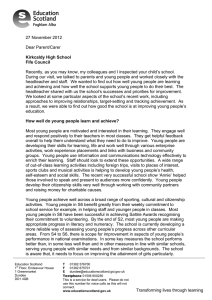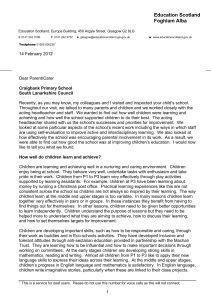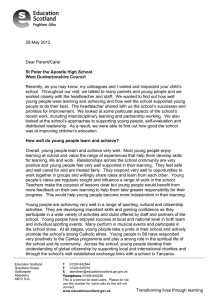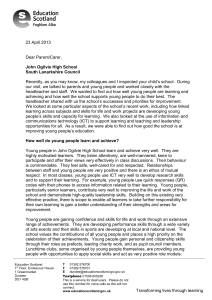5 May 2015 Dear Parent/Carer ’s school. During
advertisement
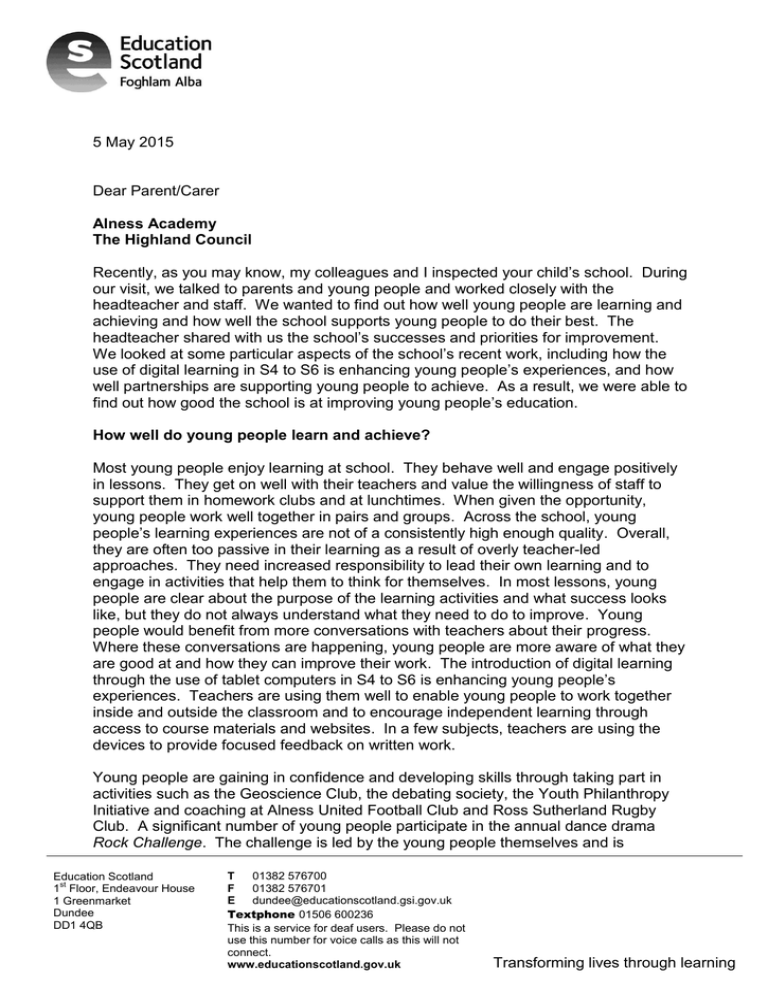
5 May 2015 Dear Parent/Carer Alness Academy The Highland Council Recently, as you may know, my colleagues and I inspected your child’s school. During our visit, we talked to parents and young people and worked closely with the headteacher and staff. We wanted to find out how well young people are learning and achieving and how well the school supports young people to do their best. The headteacher shared with us the school’s successes and priorities for improvement. We looked at some particular aspects of the school’s recent work, including how the use of digital learning in S4 to S6 is enhancing young people’s experiences, and how well partnerships are supporting young people to achieve. As a result, we were able to find out how good the school is at improving young people’s education. How well do young people learn and achieve? Most young people enjoy learning at school. They behave well and engage positively in lessons. They get on well with their teachers and value the willingness of staff to support them in homework clubs and at lunchtimes. When given the opportunity, young people work well together in pairs and groups. Across the school, young people’s learning experiences are not of a consistently high enough quality. Overall, they are often too passive in their learning as a result of overly teacher-led approaches. They need increased responsibility to lead their own learning and to engage in activities that help them to think for themselves. In most lessons, young people are clear about the purpose of the learning activities and what success looks like, but they do not always understand what they need to do to improve. Young people would benefit from more conversations with teachers about their progress. Where these conversations are happening, young people are more aware of what they are good at and how they can improve their work. The introduction of digital learning through the use of tablet computers in S4 to S6 is enhancing young people’s experiences. Teachers are using them well to enable young people to work together inside and outside the classroom and to encourage independent learning through access to course materials and websites. In a few subjects, teachers are using the devices to provide focused feedback on written work. Young people are gaining in confidence and developing skills through taking part in activities such as the Geoscience Club, the debating society, the Youth Philanthropy Initiative and coaching at Alness United Football Club and Ross Sutherland Rugby Club. A significant number of young people participate in the annual dance drama Rock Challenge. The challenge is led by the young people themselves and is Education Scotland st 1 Floor, Endeavour House 1 Greenmarket Dundee DD1 4QB T 01382 576700 F 01382 576701 E dundee@educationscotland.gsi.gov.uk Textphone 01506 600236 This is a service for deaf users. Please do not use this number for voice calls as this will not connect. www.educationscotland.gov.uk Transforming lives through learning developing their motivation, leadership skills, ability to work as a team and sense of pride in their school and community. Young people would benefit from identifying the key skills for learning, life and work they are developing through these activities. This will help them understand their strengths and increase their confidence and self-esteem. The school has begun to identify those young people who do not participate in any out-of-class learning. It is taking action to ensure all young people benefit from opportunities for achievement that will help them develop important skills. The school does not have a clear enough overview of young people’s progress from S1 to S3, across all curriculum areas. From S4 to S6, attainment in National Qualifications remains below that of young people with similar needs and backgrounds. The school is aware that staff need to continue to raise the attainment of all young people and secure stronger achievement in national examinations. Most young people are successful in moving on to a positive destination on leaving school. More young people from Alness Academy go on to employment than young people with similar needs and backgrounds in schools across Scotland. There is considerable scope to improve young people’s chances of entering further or higher education should they wish to do so. The school should continue to raise expectations of what young people can do and achieve. How well does the school support young people to develop and learn? Most young people feel safe and cared for in school. Across the school, teachers need to take steps to ensure learning activities are planned to meet the different needs of all young people. In too many lessons, activities are not set at the right level and the pace of learning is too slow. Teachers and pupil support staff provide very valuable support to young people who require additional support. The small direct tuition groups in S1 and S2 are supporting young people who need help with numeracy, literacy and health and wellbeing very well. The school works well with partner agencies such as Children’s Services, youth work staff and mental health workers, to provide relevant and effective support for young people who require it. We have asked the school to continue to work on supporting young people with high absence rates. The school should continue to explore ways of re-engaging these young people and supporting their learning when they are not in class. The school is continuing to develop its curriculum to reflect national advice relating to Curriculum for Excellence. At S1 to S3, the curriculum is designed to provide a broad general education. This includes opportunities for young people to make connections across their learning through projects such as the World War One project that led to a special school assembly on the theme of Armistice. The school needs to review the learning opportunities at these stages to ensure all young people make suitable progress. All young people in S1 and S2 have opportunities to learn Gaelic. This year, the school has been working with its associated primary schools to introduce Gaelic in P7. Staff across the school are planning for the development of young people’s literacy, numeracy and health and wellbeing. However, there is more work to be done to ensure that these important aspects of learning are developed at an appropriate level and in a joined-up way across the school. The school should continue to improve the range of courses and programmes on offer to young people from S4 to S6 to cater more fully for young people’s needs and interests. This includes working with partners to include more choices for young people who would 2 benefit from qualifications and training that develop skills for work. A few young people benefit from flexible and individualised programmes which suit their needs well. How well does the school improve the quality of its work? In her first year in post, the headteacher has established a clear vision for improving the school. She is providing effective leadership and encouraging staff to take on more responsibility for improving their practice. She has established a range of systems to evaluate the quality of the school’s work. This is resulting in a stronger commitment to self-evaluation amongst staff. Faculty heads have more clearly-defined responsibilities with a strong focus on improving performance in their departments. A few faculty heads are using self-evaluation well to improve learning and achievement in their subjects. Overall however, more needs to be done across faculties to ensure self-evaluation activities lead to better outcomes for young people. Teachers at all levels are keen to lead in a variety of ways. Staff are involved in a range of groups to take forward the school’s priorities and a few teachers have taken on leadership roles. At present, it is too early to see the impact of the work of these groups. The school has an effective system for checking young people’s achievements from S4 to S6. The school should continue to develop approaches to assess and monitor young people’s progress from S1 to S3 to ensure young people at these stages attain as highly as possible. The views of young people and parents are gathered through questionnaires and focus groups. However, there is a need for them to have a greater role in improving the work of the school. The headteacher and the senior leadership team are providing a clear direction for the school. Staff now need to take a strong lead collectively in improving learning, teaching and attainment, working as a team to improve the school. This inspection found the following key strengths. The impact of the Rock Challenge on young people’s personal development. The work of partners and support for learning staff in improving outcomes for young people who require additional support. The use of digital learning to enhance young people’s experiences from S4 to S6. We discussed with staff and The Highland Council how they might continue to improve the school. This is what we agreed with them. Improve learning and teaching to engage young people and support them in attaining as highly as possible. Review and develop the curriculum to ensure it meets the needs of all young people. Develop self-evaluation further to ensure it leads consistently to improvements in young people’s learning and achievements. Continue to develop leadership to ensure staff at all levels take appropriate responsibility for improving young people’s learning and achievement. 3 What happens at the end of the inspection? As a result of our inspection findings we think that the school needs additional support and more time to make necessary improvements. Our Area Lead Officer will work with The Highland Council to build capacity for improvement, and will maintain contact to monitor progress. We will return to carry out a further inspection within 18 months of publication of this letter. We will then issue another letter to parents on the extent to which the school has improved. Mary Byrne HM Inspector Additional inspection evidence, such as details of the quality indicator evaluations, for your school can be found on the Education Scotland website at http://www.educationscotland.gov.uk/inspectionandreview/reports/school/primsec/Alne ssAcademyHighland.asp If you would like to receive this letter in a different format, for example, in a translation please contact the administration team on the above telephone number. If you want to give us feedback or make a complaint about our work, please contact us by telephone on 0141 282 5000, or e-mail: complaints@educationscotland.gsi.gov.uk or write to us addressing your letter to the Complaints Manager, Denholm House, Almondvale Business Park, Livingston EH54 6GA. 4
